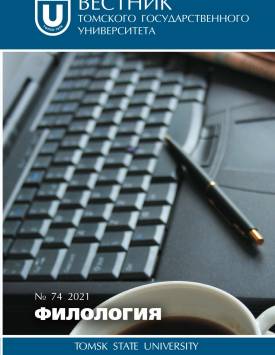Secrets of the Poltava Order of Peter I
The aim of the article is to establish the author and the date of the creation of the so-called “order” (in other sources - speeches) of Peter the Great. The monument of writing, allegedly declared to the troops on June 27, 1709, on the eve of the Battle of Poltava, is being investigated. I consider three versions of the text published at different times and having discrepancies in content and language: 1) Huyssen’s article of 1709; 2) Feofan Prokopovich’s version in the publication of 1773; 3) D.P. Buturlin’s work of 1821. During the study, three main options were identified; the dates of their creation, textual matches in these options and their linguistic features were established. A comparative analysis of the genre of the texts showed that the order was not issued and was not announced to the troops, but there was a short conversation between Peter and the soldiers, not on June 27, but on June 25 or 26 during the reconnaissance (there is information about it in the Journal of Tsar Peter 1 from 1695 to 1709 (published in 1788). In the real and rarely quoted speech of Peter, there are no lofty bookish words and splendid rhetoric. The results of a comparative lexical-semantic and syntactic analysis showed that the main ideas of the order that went down in history were set forth in the 1730s by Feofan Prokopovich, and the version of the text most often published and presented in modern textbooks was formulated and published by D.P. Buturlin. This short and expressive text, repeatedly reproduced in popular literature and educational books, was first published on April 22, 1821, in Vol 3 of The Military History of Russian Campaigns in the Eighteenth Century. Part One composed by D. Buturlin, aide-de-camp of His Imperial Majesty, and translated from French by Major General A. Khatov. Four historically significant semantic blocks are distinguished in the text: 1) assessment of the historical moment: the hour that will decide the fate of the Fatherland, 2) the purpose of the battle: you are fighting for the state, for your family, for the Orthodox faith, 3) assessment of the enemy: the glory of the enemy as invincible is a lie, you proved it by your victories over him, 4) inspiring motives: Russia should live in bliss and glory, for your well-being. A distinctive rhetorical device is opposition, repeated three times. Buturlin did the bulk of the work of collecting materials and writing the text, but Khatov translated the French text into Russian. Thus, Generals Buturlin and Khatov are the authors of an outstanding text that captured the meaning of the great Poltava victory.
Keywords
Peter’s era, history of language, linguistic source studies, written monuments, lexico-semantic analysis, syntactic modelsAuthors
| Name | Organization | |
| Sudakov Guriy V. | Vologda State University | gvs035@rambler.ru |
References

Secrets of the Poltava Order of Peter I | Vestnik Tomskogo gosudarstvennogo universiteta. Filologiya – Tomsk State University Journal of Philology. 2021. № 74. DOI: 10.17223/19986645/74/9
